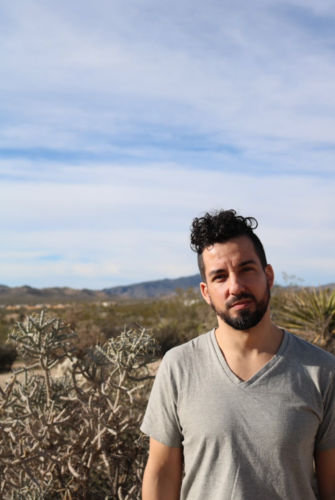A flower-blessed branch formed the air.Night pulls its hood over a head.Where did they put you, you who burned;can I bend this branch back to you?A flower-blessed branch formed the air.Who watered this red offering?In this city, white pickets failedto stop squadrons of loaded gunsstorming Daniel Medina’s housewhere I have a work permit soundslike plastic zipped on fathers’ wrists.A spat word planted in the groundgrew. My friend, I worry for you.Who turned off the stove, mopped boot-prints?Night pulls its hood over a head.Violence can be a personmoved to another state. Despairunexamined as profit is.If a man shoots a young woman(her name is Claudia Gómez)and the man had a bullet-proofsalary, new jeep, and beliefthat she was armed with a birth-place,or sunlight made flesh, where are we?Friends with hair like a wildfire’s smoke,where did they put you? You, who burned;you, with morning washed clean inside,Where did they lock you? Can you eatwhat they provide? I hear the foodis cost-effective. Are they clean,scrubbed warehouse prisons, where shadowsare scalpeled from hosed down bodies?Are children kept in the same cells?With no phone calls, who sings to them?Walls are nothing but feelings thatwhat we exclude is what makes uswhole. Is it not holy, the needto protect the people I love,or could love? (Where does my love end?)I persist in this uncontainedRepublic, rinsed in urgent dew.My friends, pursued since your first breathswhat songs call you? In what small wayscan I bend this branch back to you?
Ecuadorian Decima for the Taken
Feature Date
- January 31, 2024
Series
Selected By
Share This Poem
Print This Poem
“Ecuadorian Decima for the Taken” from BANANA []: by Paul Hlava Ceballos.
Published by Macmillan in September, 2022.
Copyright © 2024 by Paul Hlava Ceballos.
All rights reserved.
Reproduced by Poetry Daily with permission.

Paul Hlava Ceballos is the author of banana [ ], winner of the AWP Donald Hall Prize and the Poetry Society of America’s Norma Farber First Book Award, and a finalist for the National Book Critics Circle Award and Washington State Book Award. His collaborative chapbook, Banana [ ] / we pilot the blood, shares pages with Quenton Baker and Christina Sharpe. He has fellowships from CantoMundo, Artist Trust, and the Poets House. He has been featured on the Poetry Magazine Podcast and Seattle’s The Stranger. He currently lives in Seattle with his family, where he practices echocardiography.
"Hlava Ceballos’s book seeks to intervene in our collective ignorance, to illuminate dark chapters of our interconnected histories. His artwork challenges us to look more closely at the fruit occupying our grocery stores and breakfast tables."
—Yes Magazine
"banana [ ] assuredly interrogates the systems and dead philosophies in the grip of which we find ourselves. Only by addressing these forces will we make the necessary and existential progress in an effort to salvage a livable and equitable planet."
—VerseCurious
"The first poem in this book completely swept me off my feet. As pages of this book turn, one quickly realizes that the whole manuscript is filled with invention, passion, and skill. I love the restlessness and the attentiveness to language. But most importantly: the invention and lyric textures in this book aren’t here just for the show; they are setting to music the urgency of our time. That is a hard thing to do, and this poet does it again and again."
—Ilya Kaminsky, Donald Hall Prize guest judge and author of Deaf Republic
"Paul Hlava Ceballos’s banana [ ] renders personal and cultural histories. The personal and naturally political, Eden and Hades converge into a landscape of experimental form that propels us forward. Names and places pay tribute in the languages of everyday life to bear witness and celebrate human rituals—familial and communal. In banana [ ], Hlava Ceballos exacts these poems with such caring precision, fully resonant, lit by earth and sky."
—Yusef Komunyakaa, author of Everyday Mojo Songs
"The poems in Paul Hlava Ceballos’s banana [ ] are elegy, labor, and repair. The title poem is one of stripping away and accretion constructed from the words of others. It is made from racist emails, racist popular culture, from interviews, declarations, from reports that detail or obscure violence and living. An entire grammar emerges across the poem’s three sections."
—Christina Sharpe, author of In the Wake: On Blackness and Being
"Three texts exist simultaneously within banana [ ]: one is curated and is clearly visible, a second has been strategically redacted, and a third the reader puts together in imagining the text whole again. Using this strategy, Ceballos creates a house of mirrors in which the legal, historical, anthropological, and agricultural language of violence employed by the US empire across Central America can be dissected. A master at the enthymeme, this collection’s contributions to inventive forms astounds."
—Natalie Scenters-Zapico, author of Lima :: Limón
Poetry Daily Depends on You
With your support, we make reading the best contemporary poetry a treasured daily experience. Consider a contribution today.

![Cover of banana []](https://training.poems.com/wp-content/uploads/2024/01/Screenshot-2024-01-29-at-4.02.41-PM-e1706562235521.png)


